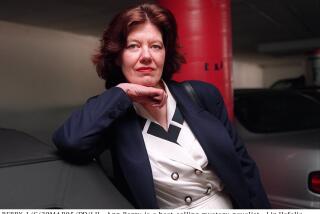The wrong abortion signal?
On May 5, subscribers to Planned Parenthood’s mailing list received an e-mail from author Judy Blume. Cleverly headed “Are You There [Your Name Here]? It’s me, Judy” (a reference to Blume’s classic young-adult novel, “Are You There God? It’s Me, Margaret”), the message made a pitch for Mother’s Day donations. “It’s not easy to be a mother these days,” Blume wrote. “And right now -- with more and more women seeking care from Planned Parenthood health centers -- we need to do all we can to support them. By honoring a mother in your life, you’ll be making a gift to millions of mothers and families who seek care from Planned Parenthood.”
The next day, an e-mail titled “Judy Blume backlash -- please help!” arrived from Planned Parenthood’s president, Cecile Richards, who wrote: “Anti-choice extremists are inundating [Blume] with hate mail and phone calls.”
That e-mail included links to donation forms on Planned Parenthood’s website as well as a hastily created “Stand up for Judy Blume” page where supporters could send encouraging words to the author -- even though Blume is famous for her frank treatment of subjects related to puberty and sexuality and is presumably no stranger to hate mail.
Much of the push-back appears to have been generated by an article in the pro-life publication LifeNews, which put some heavy, misrepresentative spin on Blume’s words. “Blume notes how more women are seeking abortions from Planned Parenthood because of the difficult economy,” wrote LifeNews Editor Steven Ertelt, “and she urges readers of the e-mail to use that as a reason to support the abortion business.” Ertelt provided an e-mail address for Blume as well as a link to her website and urged readers to write and voice their complaints.
Needless to say, this is just the kind of thing that makes abortion-rights advocates apoplectic. In the blogosphere and elsewhere, pro-choicers fired back, imparting the statistic about abortion making up only 3% of Planned Parenthood’s services and pointing out that many of the women being yelled at by picketers in clinic parking lots aren’t even pregnant but, rather, trying to avoid getting pregnant. “Are you there LifeNews? It’s me, Reality,” wrote a commenter on the popular women’s media blog Jezebel.
Like Blume, who is one of the most beloved and most censored American authors of the last few decades, Planned Parenthood occupies a clear position on the post-Roe cultural map. Generally speaking, if you’re on board with abortion rights, you’re on board with Planned Parenthood. If you’re pro-life, the organization is the headquarters of Godlessness. And while there are surely Blume fans who don’t favor legalized abortion, it’s easy to see why Planned Parenthood enlisted her as a fundraiser. An icon of 1970s-era feminism and its efforts on behalf of sex education and women’s health, she elicits certain nostalgia for the early days of the fight that makes pro-choicers want to keep fighting today.
But in seeing this saga unfold in my inbox, I was struck by a troubling question. Even though Blume may not be associated with abortion in and of itself (none of her protagonists ever got one), is there something about her persona that signals a lack of dispassion about its ramifications? Is she reminding people of a time when, in the relief of Roe being decided, there was a cultural perception that abortion was a simple procedure that needn’t come with attendant emotional baggage?
That’s not to suggest that, back in the day, a lot of women put abortion in the category of getting a tooth filled, nor is it true that all women today agonize over the decision. But there’s no denying that the language and overall tone around abortion has changed. Despite what many pro-life groups seem to think, most abortion-rights advocates prefer “safe, legal and rare” to “no big deal.”
President Obama, pro-choice though he is, is hardly strident -- and even a little evasive -- on the issue, favoring language about reducing the number of abortions and finding common ground with the other side. The pop cultural arena, for its part, has become downright allergic to the issue. In 1972, the sitcom heroine Maude had an abortion (on prime-time TV), and a story line in the 1982 movie “Fast Times at Ridgemont High” included it with relatively little fanfare, but 2007’s “Knocked Up” is so squeamish that the characters can’t even get the word out, hence the coinage of “shmashmortion.” (Don’t be surprised if, as he readies his Supreme Court nomination, the president himself adopts this term.)
That doesn’t make Judy Blume a bad choice for Planned Parenthood. She -- or more correctly, the ruckus -- was undoubtedly more effective at raising money than the pitch from Gwyneth Paltrow and Blythe Danner, who sent a similar e-mail on the organization’s behalf days later. But for all of Blume’s radical (if nostalgic) cachet, what might be even more radical is if the pro-choice community could find a way of talking about reproductive freedom that neither reverts to the perceived casualness of the 1970s nor panders to the “shmashmortion” dialect of today. “Safe, legal and rare” comes close. But “safe, legal, rare and a big deal” might be even better.
More to Read
Sign up for our Book Club newsletter
Get the latest news, events and more from the Los Angeles Times Book Club, and help us get L.A. reading and talking.
You may occasionally receive promotional content from the Los Angeles Times.








